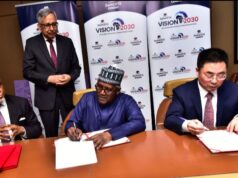
Vice President Yemi Osinbajo has insisted that Nigeria doesn’t have debt problem.
“On the positive side, the economy continues to grow with GDP growth at 3.54% in the 2nd quarter of this year. Non-oil revenues have similarly continued to improve due in part to strategic revenue initiatives, including the annual Finance Act.”
“But it is still our revenue challenges that heighten the notion that we have a debt problem, which is really not the case, given that our debt/GDP ratio is just 23%.”
Professor Osinbajo, who spoke today, November 14 on behalf of President Muhammadu Buhari, at the opening event of this year’s National Economic Summit, said that though the country’s current debt service to revenue ratio is high, but that “unlike in the past, when we were not keeping a close eye on debt matters, the creation of the Debt Management Office means that we are better able to adopt strategies to manage our debt, including using more concessional loans, spreading out our debt maturities and re-financing short-term debt with longer-term debt instruments.”
“This is why increasing revenues should engage most of the attention.
“We have already seen real improvements in our non-oil revenues, but our focus must now be on productivity or encouraging value addition. Productivity and value addition means creation of traceable value; it means jobs, opportunities, and more tax revenues.”
“To increase productivity, we must free up our environment for business, make local and international trade easier by fixing the ports, effecting the National Single Window, revamping our Customs processes and Tariff codes to reduce delays and arbitrariness, removing needless restrictions on imports to enable value added processes.”
Professor Osinbajo emphasized that Nigeria must also press its advantage in renewable energy, noting that “the future are the jobs and opportunities from the green economy.”
“Solar Power Naija programme launched under the Economic Sustainability Plan which is designed to achieve 5 million solar connections impacting over 25 million Nigerians will contribute in this regard. But the impact includes opportunities in manufacturing and maintaining solar equipment and facilities.”
He also highlighted local security and economic challenges, global turbulence on the political, economic and social fronts, including the Russia-Ukraine war and global tensions, which he noted “is impacting Africa, including through higher food prices and disruptions to democratic governance.”
The Vice President said that with global economy still recovering from the effects of COVID-19, as well as the challenges posed by climate change, which has caused flooding in several states in Nigeria, “it is clear that our work is cut out and we have to choose our priorities going forward very carefully.
“There are a whole gamut of things that require our attention and many are well captured in the National Development Plan 2021 to 2025.”
On the volatility of the country’s exchange rate, Professor Osinbajo said that the discussion that “we must have, shorn of sentiments, is how best to manage the situation by finding a mechanism for increasing supply and moderating demand, which will be transparent and will boost confidence.”
The Vice President emphasized the need for urgent action to reduce inflation, noting that inflation is both a tax on the poor and disrupts long term growth.
In addition to the monetary measures being taken by the Central Bank of Nigeria, Professor Osinbajo said: “we would need to increase domestic production of food and ensure that it gets to the market.”
“In this regard, we must pay closer attention to the institutional insight of the Agriculture for Food and Jobs Programme of the Economic Sustainability Plan (ESP), which sought to support small scale farmers by guaranteeing uptake of their production through enabling bigger farmers, suppliers to manufacturing companies and commodity exchanges to support them across every stage of production.”







Thank you for your sharing. I am worried that I lack creative ideas. It is your article that makes me full of hope. Thank you. But, I have a question, can you help me?
Thanks for sharing. I read many of your blog posts, cool, your blog is very good.